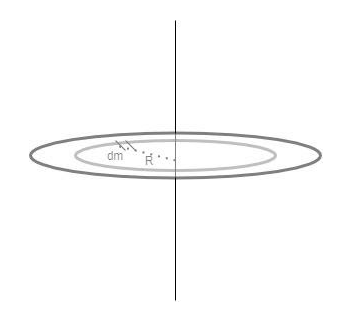
Moment of inertia of a thin circular plate of mass M, radius R about an axis passing through its diameter is I. The moment of inertia of a circular ring of mass M, radius R about an axis perpendicular to its plane and passing through its centre is:
1) $2I$
2) $\dfrac{I}{2}$
3) $4I$
4) $\dfrac{I}{4}$
Answer
573.6k+ views
Hint:Imagine a disc of radius R with a small area dm and integrate them. Here, we need to consider an imaginary ring inside the disc and then integrate it for the whole ring. The diameter is given as “I” so the radius will be half of “I”.
Complete step by step solution:

Calculate the moment of inertia of the above circular disc:
$\int {dI} = \int {dM\dfrac{R}{2}} dR$
\[ \Rightarrow \int {dI} = \dfrac{1}{2}\int {dM} RdR\]
Now, solve the integration:
\[ \Rightarrow I = \dfrac{1}{2} \times \dfrac{{{R^2}}}{2} \times M\]
\[ \Rightarrow I = \dfrac{{M{R^2}}}{4}\]
Now, the above moment of inertia is for the disc, then moment of inertia for the ring:
Here, for the ring the moment of inertia of radius R would remain constant:
$\int {dI' = \int {dM{R^2}} } $
Take the constant out:
$ \Rightarrow \int {dI' = {R^2}\int {dM} } $
\[ \Rightarrow I' = M{R^2}\]
Now, divide the moment of inertia for the disc by the ring:
\[ \Rightarrow \dfrac{I}{{I'}} = \dfrac{{\dfrac{{M{R^2}}}{4}}}{{M{R^2}}}\]
\[ \Rightarrow \dfrac{I}{{I'}} = \dfrac{{M{R^2}}}{{4 \times M{R^2}}}\]
Now, do the needed calculation:
\[ \Rightarrow \dfrac{I}{{I'}} = \dfrac{1}{4}\]
\[ \Rightarrow 4I = I'\]
Final Answer:Option “3” is correct. Therefore, the moment of inertia of a circular ring of mass M, radius R about an axis perpendicular to its plane and passing through its centre is 4I.
Note:Here, we need to first derive the moment of inertia of the disc which is passing through the diameter and then derive the moment of inertia of the ring and after that we need to compare both the moment of inertia and find the relation between the two moment of inertia.
Complete step by step solution:

Calculate the moment of inertia of the above circular disc:
$\int {dI} = \int {dM\dfrac{R}{2}} dR$
\[ \Rightarrow \int {dI} = \dfrac{1}{2}\int {dM} RdR\]
Now, solve the integration:
\[ \Rightarrow I = \dfrac{1}{2} \times \dfrac{{{R^2}}}{2} \times M\]
\[ \Rightarrow I = \dfrac{{M{R^2}}}{4}\]
Now, the above moment of inertia is for the disc, then moment of inertia for the ring:
Here, for the ring the moment of inertia of radius R would remain constant:
$\int {dI' = \int {dM{R^2}} } $
Take the constant out:
$ \Rightarrow \int {dI' = {R^2}\int {dM} } $
\[ \Rightarrow I' = M{R^2}\]
Now, divide the moment of inertia for the disc by the ring:
\[ \Rightarrow \dfrac{I}{{I'}} = \dfrac{{\dfrac{{M{R^2}}}{4}}}{{M{R^2}}}\]
\[ \Rightarrow \dfrac{I}{{I'}} = \dfrac{{M{R^2}}}{{4 \times M{R^2}}}\]
Now, do the needed calculation:
\[ \Rightarrow \dfrac{I}{{I'}} = \dfrac{1}{4}\]
\[ \Rightarrow 4I = I'\]
Final Answer:Option “3” is correct. Therefore, the moment of inertia of a circular ring of mass M, radius R about an axis perpendicular to its plane and passing through its centre is 4I.
Note:Here, we need to first derive the moment of inertia of the disc which is passing through the diameter and then derive the moment of inertia of the ring and after that we need to compare both the moment of inertia and find the relation between the two moment of inertia.
Recently Updated Pages
Master Class 11 Computer Science: Engaging Questions & Answers for Success

Master Class 11 Business Studies: Engaging Questions & Answers for Success

Master Class 11 Economics: Engaging Questions & Answers for Success

Master Class 11 English: Engaging Questions & Answers for Success

Master Class 11 Maths: Engaging Questions & Answers for Success

Master Class 11 Biology: Engaging Questions & Answers for Success

Trending doubts
One Metric ton is equal to kg A 10000 B 1000 C 100 class 11 physics CBSE

There are 720 permutations of the digits 1 2 3 4 5 class 11 maths CBSE

Discuss the various forms of bacteria class 11 biology CBSE

Draw a diagram of a plant cell and label at least eight class 11 biology CBSE

State the laws of reflection of light

10 examples of friction in our daily life




